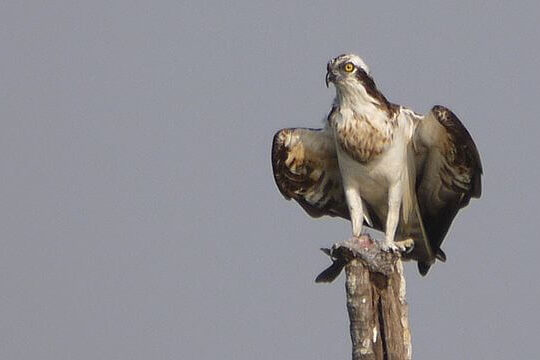
For the first time in over two centuries, evidence suggests that ospreys have successfully bred in Ireland.
This groundbreaking discovery was made at a confidential nesting site in County Fermanagh, with the commendable efforts of Ulster Wildlife. A devoted osprey pair has managed to raise at least two, potentially three, chicks after consistently returning to the same site since 2021.
Ospreys, medium-sized raptors with a diet predominantly comprised of fish, are typically found in close proximity to bodies of water. The remarkable re-establishment of these birds was uncovered by Giles Knight, an environmental farming scheme advisor at Ulster Wildlife, who has been closely monitoring the breeding pair’s activities over the past three seasons.
These birds are renowned for their nesting fidelity, often occupying the same treetop site for up to two decades and displaying unwavering loyalty to both their nesting location and mate. To safeguard the well-being of these remarkable creatures, the news of their successful breeding has been kept confidential for some time.
“You can imagine my excitement the moment that I saw three chicks and two adults this year,” he said.
“It was a rub-your-eyes, once-in-a-lifetime moment; an absolute highlight of my 30-year wildlife career – like finding long-lost treasure.
“With at least two of the chicks fledging this season, this is a huge conservation success story and indicates a healthy wetland ecosystem with plenty of suitable habitat and fish to bring this apex predator back to our skies and plunging into the Fermanagh lakelands.”
Ospreys are designated as a species of conservation concern in the UK, earning a place on the amber list. This classification is a reflection of their sustained population decline over the years. Given their status as a protected species in Northern Ireland, the success of the osprey pair’s breeding in Fermanagh is particularly significant.
Ospreys, which had been presumed extinct as breeding birds in Ireland since the late 18th century, are occasionally sighted during their migrations to and from sub-Saharan Africa. In light of their historical absence, the Irish government announced plans in May to reintroduce ospreys to Ireland, with an ambitious goal of bringing 50 to 70 chicks from Norway over a five-year period. These imported chicks are intended to establish a self-sustaining population that will eventually breed in Ireland.
Efforts are ongoing to closely monitor the undisclosed nesting site in Fermanagh, with an earnest appeal to the public to refrain from disturbing the osprey family. The successful breeding of these birds in Ireland after such a lengthy hiatus marks a significant milestone in the preservation of this remarkable species and is an encouraging step forward in wildlife conservation efforts.
Mr Knight added: “Now these birds are back in Ireland and breeding successfully, it is critical that they are left in peace so their numbers can continue to grow by returning year on year to breed.
“We believe and hope that this could be the start of a raptor dynasty.”
——————————————————————————
At Natural World Fund, we are passionate about stopping the decline in our wildlife.
The decline in our wildlife is shocking and frightening. Without much more support, many of the animals we know and love will continue in their decline towards extinction.
When you help to restore a patch of degraded land through rewilding to forests, meadows, or wetlands, you have a massive impact on the biodiversity at a local level. You give animals a home and food that they otherwise would not have had, and it has a positive snowball effect on the food chain.
We are convinced that this is much better for the UK than growing lots of fast-growing coniferous trees, solely to remove carbon, that don’t actually help our animals to thrive.
This is why we stand for restoring nature in the UK through responsible rewilding. For us, it is the right thing to do. Let’s do what’s right for nature!
Donate today at https://naturalworldfund.com/ and join in the solution!

